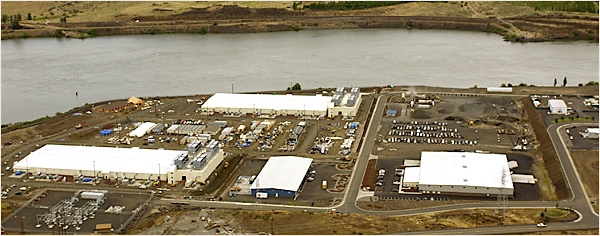Google’s Secret Weapon?
On the banks of the windswept Columbia River,
Google is working on a secret weapon in its quest to dominate the next
generation of Internet computing.

On the banks of the windswept Columbia River, Google is working on a secret weapon in its quest to dominate the next generation of Internet computing. But it is hard to keep a secret when it is as big as two football fields, with twin cooling towers protruding four stories into the sky.
Microsoft and Yahoo have announced they are building giant data centers upstream in Washington State, 130 miles to the north. But Google is doing something radically different here. The very need for two cooling towers, each connected to a football field-sized data center, is evidence of its extraordinary ambition.
As imposing as Google’s new Oregon data center is, when it opens it will only be a piece of a worldwide computing system known as the Googleplex, which is tied together by strands of fiber optic cables. A similar computing center has recently been completed in Atlanta.
“Google has constructed the biggest computer in the world, and it’s a hidden asset,” said Danny Hillis, a supercomputing pioneer and the cofounder of Applied Minds, a technology consulting firm, referring to the Googleplex.
The design and even the nature of the Google center in this industrial and agricultural outpost 80 miles, or 130 kilometers, east of Portland, Oregon, has been a closely guarded corporate secret. Many local officials in The Dalles, including the city attorney and the city manager, said they could not comment on the Google data center project, referred to locally as Project 02, because they signed confidentiality agreements with the company last year.
“No one says the ‘G’ word,” said Diane Sherwood, who, as executive director of the Port of Klickitat, Washington, directly across the river from The Dalles, is not bound by such agreements.
Google is known to the world as a search engine, but in many ways it is foremost an effort to build a network of supercomputers, using the latest academic research, that can process more data, faster and cheaper than its rivals.
The rate at which the Google computing system has grown is as astounding as its size. In March of 2001, when the company was serving about 70 million Web page views daily, it had 8,000 computers, according to a Microsoft researcher who was given a detailed tour of one of the company’s Silicon Valley computing centers. By 2003 the number had grown to 100,000.
Today even the closest Google watchers have lost precise count of how big the system is. The best guess is that Google now has more than 450,000 servers spread in at least 25 locations around the world. The company has major operations in Ireland, and is building significant facilities in China and Russia. Connecting these centers is a high- capacity data network that the company has assembled over the past few years.
Rock on!
Posted: Wed - June 14, 2006 at 06:11 AM